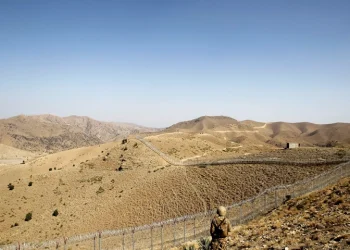ISLAMABAD: Federal Minister for Finance and Revenue Miftah Ismail on Saturday said worsening government administration in the past had caused huge damage to the national economy and drifted it to the verge of collapse that compelled the coalition government to present a tough budget.
Addressing the post-budget press conference here, he said if that maladministration were not addressed timely, it would cause further devastation and that was why the incumbent government had to present such a budget to address those issues.
The minister was flanked by Minister for Information and Broadcasting Marriyum Aurangzeb, Minister of State for Finance and Revenue Aisha Ghaus Pasha, and Finance Ministry officials.
Miftah said there was a need to correct the country administratively, otherwise, its economy would not be run. “We have to go to other countries for loans, packages, and deposits. Pakistan is a proud country, a country of proud people, a nuclear power country, and we will have to fix our economy,” he said. “We should not incur such expenditures that we cannot afford.”
The minister said the budget was presented at a difficult time when the country was passing through very hard times.
“At least for the last 30 years…. I have never seen such difficult times where on one side Pakistan is faced with an internationally challenging environment and on the other, the government administration has worsened,” the minister remarked. Unfortunately, nothing was done by the previous regime to correct the economy, he added.
Citing huge losses in the power and gas sectors, the minister said during the past year, around Rs 3,400 billion losses were recorded in the two sectors owing to subsidies and defaults.
The minister said subsidies of more than Rs 1,100 billion were given in the power sector, whereas the circular debt reached Rs 500 billion, taking the total losses of the sector to Rs 1,600 billion.
The country had no capacity to bear those huge losses, which, if not addressed, would damage the economy, he added.
Likewise, the minister said, Rs 400 billion subsidy was given in the gas sector coupled with Rs 1400 billion circular debt whereas the Sui Northern Gas Pipelines Limited (SNGPL) faced a loss of Rs 200 billion. Gas valuing $2.4 billion was lost annually at the network of the SNGPL, which had never been accounted for.
However, he assured that the government would provide gas to the industry at rates that were competitive in the regional market.
The minister said the previous government had caused huge damages to the economy, however, Prime Minister Shehbaz Sharif took difficult decisions and would continue to take more, if required, to put the country back on track.
The government had no other options but to make difficult decisions and the budget reflected that, he reiterated.
Miftah said during the current fiscal year, there was almost a Rs 4,598 billion deficit. Four big deficits in the country’s history were witnessed during the Pakistan Tehreek-i-Insaf government.
He said owing to the huge debts taken by the previous regime, the current government set aside Rs 3,950 billion for debt servicing, which was equal to two defense budgets of the country.
The minister enumerated that the total revenue target had been set at Rs 7,004 billion and if non-revenue resources were added it would take the total revenue to Rs 9,000. Out of it, an amount of Rs 4,000 billion would be the share of provinces, hence the net collection with the federal government would be around Rs 5,000 billion.
He said if Rs 4,000 billion were spent on debt servicing, then the amount remaining with the federal government would be mere Rs 1,000 billion to manage all affairs. If other liabilities were also counted, then the country would actually start the new fiscal year with a minus Rs 600 billion budget.
He said it was unfortunate that despite having huge resources, the country was facing such difficult times. Once it was ahead of India and Bangladesh, but due to mismanagement, “we have come to this bad situation”.
Finance Minister Miftah Ismail said in the BISP, that the government had increased its share by 40%, or Rs 100 billion.
He said Prime Minister Shehbaz had recently talked to the Indonesian president to lift a ban on the import of palm oil, as it caused a steep hike in its price to $1700 per ton in the international market.
The government, he said, had also proposed a package of Rs 20 billion for the promotion of seed oils, aiming to increase their production which would help reduce the external dependency on producing cooking oil.
The minister said in the budget 2022-23, the government proposed a one percent tax on the properties held abroad by the local Pakistanis.
With respect to tax measures on personal income, he said the government decided to provide relief to the small and medium-income salaried persons as taxes were being reduced on those drawing monthly salary up to Rs 200,000 per month, however, taxes were being increased on those getting a monthly salary of over Rs 1 million.
He said the government had also decided to bring 2.5 million shopkeepers into the tax net, who would be charged the fixed tax ranging from Rs 3000 to Rs 10,000, which would be collected along with the utility bills.
To a question about a cut in the funds allocations for the Azad Jammu and Kashmir, he said the government had reduced all government expenditures.
With respect to the privatization process, Miftah said the government was committed to continuing the privatization process, and two big companies would be privatized immediately.
To a question with regard to the measures to reduce inflation, the minister maintained that the government’s first and foremost target was fiscal consolidation, to save the country financially.
Miftah Ismail gave an open offer to all litigant businessmen to withdraw their cases as the government was ready for out-of-court settlements under its ease-of-doing-business measures.
He said the government had set a target to bring 2.5 million shopkeepers into the tax net, who would be charged with a fixed tax of Rs 3,000 to Rs 10,000.
The minister said as the agriculture sector development was on top of the government’s agenda, it decided to withdraw duties and taxes on different agriculture implements, including seeds and agro-machinery.
The government also allocated Rs 21 billion in the federal budget 2022-23 to increase crops yield, besides uplifting the livestock sector, he added.
Minister of State Dr. Ayesha Ghous Pasha on the occasion explained that the tough decisions announced in the budget 2022-23 were aimed at stabilizing the economy.
In such circumstances, she said, the government had tried its best not to pass on the impact of tough decisions and revenue measures to the common man.
She said the measures to enhance revenue were anti-inflationary, and the government had also increased allocation for the Benazir Income Support Programme (BISP), besides providing significant subsidy on inputs to promote the agriculture sector.
The relief measures in the agriculture sector would help the country attain self-sufficiency in commodities, she added.
Dr. Pasha said additional taxes were imposed only on the wealthy people, in order to avoid further burdening the poor.
She said the world was passing through the super cycle of inflation and Pakistan was also not an exception, which was badly hit.
To another question, Dr. Pasha said, “We took measures to decrease the import-led consumption in order to help ease the inflation rate.”

































